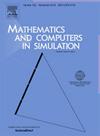基于粒子滤波的最大似然 LM 识别,适用于稀缺测量数据 MIMO Hammerstein Box-Jenkins 系统
IF 4.4
2区 数学
Q1 COMPUTER SCIENCE, INTERDISCIPLINARY APPLICATIONS
引用次数: 0
摘要
稀缺测量数据系统是指一个系统的输入或输出采样时间序列稀缺。因此,在稀缺测量数据系统中,采样数据是不完整的。本文研究了稀缺测量数据多输入多输出哈默斯坦箱-詹金斯(S-MIMO-H-BJ)系统的参数估计。为了充分利用系统数据而不增加未知参数,本文采用粒子滤波方法来获取稀缺测量数据系统中的未知状态和变量。因此,得出了基于粒子滤波的最大似然 Levenberg Marquardt(ML-LM)迭代法(ML-LM-I-PF)。为了验证所提算法的优越性,还推导出了基于辅助模型的 ML-LM 迭代方法(ML-LM-I-AM)。最后,利用这两种算法,确定了 S-MIMO-H-BJ 数值示例和双罐电平系统中的未知参数。仿真证明,这两种方法都能有效估计 S-MIMO-H-BJ 模型,但 ML-LM-I-PF 方法的计算量更小,参数估计更准确,因此表现更好。本文章由计算机程序翻译,如有差异,请以英文原文为准。
Maximum likelihood LM identification based on particle filtering for scarce measurement-data MIMO Hammerstein Box-Jenkins systems
The scarce measurement-data system means that the input or output of one system are sampled at scarce time series. Thus, the sampled data are incomplete in scarce measurement-data systems. In this paper, the parameter estimation of scarce measurement-data multiple input multiple output Hammerstein Box-Jenkins (S-MIMO-H-BJ) systems is studied. To make full use of the system data without adding unknown parameters, the particle filtering method is applied to obtain unknown states and variables in scarce measurement-data systems. Thus, the maximum likelihood Levenberg Marquardt (ML-LM) iterative method based on particle filtering (ML-LM-I-PF) is derived. To verify the superiority of the proposed algorithm, the ML-LM iterative method based on auxiliary model (ML-LM-I-AM) is also derived. Finally, using these two algorithms, unknown parameters in the S-MIMO-H-BJ numerical example and the two-tank level system are identified. Simulations prove that these two methods can all estimate S-MIMO-H-BJ models effectively, but the ML-LM-I-PF method behaves better because it has smaller calculation amount and more accurate parameter estimation.
求助全文
通过发布文献求助,成功后即可免费获取论文全文。
去求助
来源期刊

Mathematics and Computers in Simulation
数学-计算机:跨学科应用
CiteScore
8.90
自引率
4.30%
发文量
335
审稿时长
54 days
期刊介绍:
The aim of the journal is to provide an international forum for the dissemination of up-to-date information in the fields of the mathematics and computers, in particular (but not exclusively) as they apply to the dynamics of systems, their simulation and scientific computation in general. Published material ranges from short, concise research papers to more general tutorial articles.
Mathematics and Computers in Simulation, published monthly, is the official organ of IMACS, the International Association for Mathematics and Computers in Simulation (Formerly AICA). This Association, founded in 1955 and legally incorporated in 1956 is a member of FIACC (the Five International Associations Coordinating Committee), together with IFIP, IFAV, IFORS and IMEKO.
Topics covered by the journal include mathematical tools in:
•The foundations of systems modelling
•Numerical analysis and the development of algorithms for simulation
They also include considerations about computer hardware for simulation and about special software and compilers.
The journal also publishes articles concerned with specific applications of modelling and simulation in science and engineering, with relevant applied mathematics, the general philosophy of systems simulation, and their impact on disciplinary and interdisciplinary research.
The journal includes a Book Review section -- and a "News on IMACS" section that contains a Calendar of future Conferences/Events and other information about the Association.
 求助内容:
求助内容: 应助结果提醒方式:
应助结果提醒方式:


